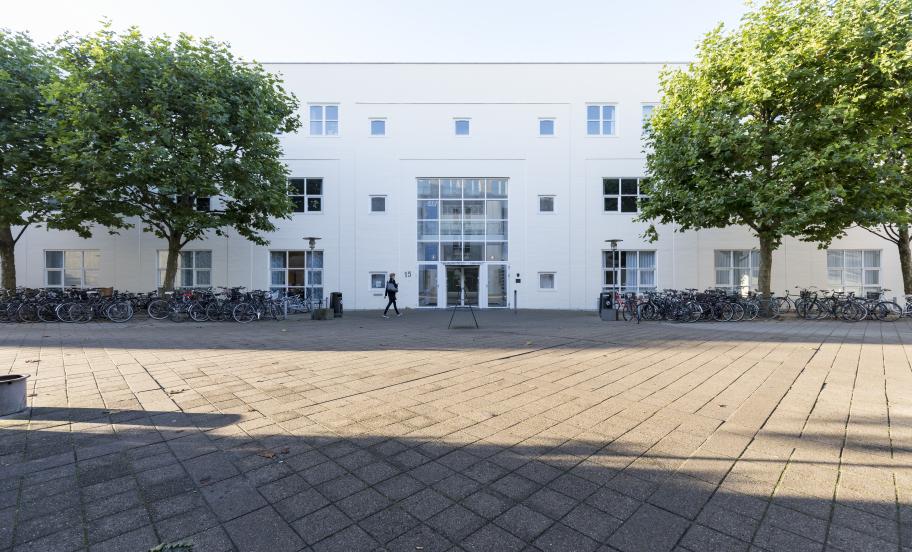MSc in Business Administration and Data Science
The MSc DSC equips you to combine programming and advanced analytics with solid business understanding. You’ll work hands-on with big data, machine learning, and visualisation to turn complex data into insights that drive decision-making, innovation, and strategy in organisations.

Om MSc in Business Administration and Data Science
Why study MSc DSC?
3 good reasone to choose MSc DSC
Interest in data and technology
Interest in solving business problems
Interest in collaboration and communication
“ You do not need to have any prior knowledge of coding, however, if you don’t, the first semester is really busy and very challenging. ” Inês
Student, MSc DSC

Use data to make business decisions
The MSc in Business Administration and Data Science is designed for students who want to work at the intersection of data and business. The programme combines solid analytical and technical training with a deep understanding of how organisations can use data to make better decisions and create innovation. As a student, you will gain the skills to transform complex data into actionable insights that matter in practice.
Build on a technical foundation
Throughout the programme, you will work with programming languages such as Python and R, explore big data platforms like Hadoop and Spark, and apply advanced methods from machine learning, deep learning, and predictive analytics. This technical foundation is always linked to business cases, ensuring that you learn to connect data-driven solutions with strategic and operational challenges faced by companies and organisations today.
“ I really like that the programme always looks at data science topics from a business perspective - for example by going through case studies or by lectures given by industry experts. ” Jan
Student, MSc DSC

Mix of teamwork and individual efforts
The learning environment is hands-on and collaborative. Many courses are structured around group projects that result in written products, dashboards, or data-driven models, which are then presented and discussed in individual oral exams. You will also encounter individual home assignments and written sit-in exams that test your ability to work independently. This mix of formats gives you both teamwork experience and individual accountability, reflecting how data science is applied in real organisations.
Create value in organisations and society
The programme places strong emphasis on communication, ethics, and compliance. You will learn how to present technical findings to both business leaders and technical specialists, and how to design solutions that meet ethical standards and legal regulations. By combining advanced analytics with business understanding, the programme prepares you to become a professional who can bridge data science and business administration, and create value for organisations and society alike.
Open day for master programmes 2026
Are you considering a master programme at CBS? Come visit us for Open Day and hear about your opportunities .
Read more
Master events
See upcoming events that can help you with your study choice and admission.
Opbygning
IT og teknologi
You learn how to use programming, algorithms, and digital tools to solve complex business problems. IT and technology in MSc DSC focus on transforming data into insights and solutions that support innovation and strategic decision-making.
Økonomi og matematik
You learn to use economic theory, statistics, and quantitative models to analyse data and support decision-making. Economics and mathematics in MSc DSC provide an analytical foundation for understanding markets, behaviour, and risk in a data-driven business world.
3 things to consider
Technical intensity
Workload and exam style
Balancing business and data
Programme overview
1. semester
2. semester
3. semester
4. semester
More about the programme
From theory to application
As you’ll move through the programme, there is a clear shift from learning core methods to applying them in practice. For example, early programming projects build technical skills, while later courses where you shall develop dashboards, conduct predictive modelling, and present solutions linked to business strategy.
Options during the programme
Electives
On the 3rd semester, you can choose to study courses of your specific interest. CBS offers a large number of electives within a wide range of topics. You can also choose to take electives at other Danish universities. The electives you choose have to be relevant for your programme.
See the current selection of CBS electives on Courses at master level.
Minor
On the 3rd semester, you can also choose to study a so-called minor. A minor is a package of electives within a specific academic area. Typically, it consists of 3 courses. By taking a minor, you strengthen your competences within a specific area of interest, and you can use it to qualify for specific jobs or industries.
See the current selection of CBS minors on Minors.
Exchange
Many students choose to go on exchange on their 3rd semester; usually at one of CBS’ more than 300 partner universities. When you go on exchange through CBS, you do not have to pay for the teaching at the foreign university (with a few exceptions), and you can bring your SU (student grant).
Find a list of all CBS partner universities here.
Internship
You can choose to replace some of your electives with a so-called academic internship. The academic internship consists of an internship period at a company, which is then completed with a project report. You can do the internship at a company in Denmark or abroad.
When doing an internship you get the opportunity to relate theory to practice and reflect on the academic training you receive at CBS in a practical setting. Therefore, the project report and work assignments during your internship have to be relevant to your study programme.
Master's thesis
Your second year is completed with a master's thesis. You choose the topic you want to write about, which allows you to focus on a specific topic of your interest. Typically, you write your master's thesis with a fellow student.
“ MSc DSC is perfect for people like me who are passionate about data science, but are more interested into its business applications instead of, for example, deep diving into small mathematical details. ” Jan
Student, MSc DSC

Studiemiljø
You’ll spend much of your time working in small groups on projects, developing written products and dashboards, and preparing for oral exams. This collaborative way of studying means you will learn from each other’s perspectives and share responsibility for producing high-quality work, while still being assessed individually.
Student life at CBS
Studying at CBS is much more than just preparing for and going to classes.
At CBS, there are more than 20,000 students with different backgrounds and nationalities. Teamwork is an essential part of studying at CBS both in classes and in extracurricular activities.
With more than 100 student organisations, you also have plenty of opportunities to engage and connect with students across programmes and classes.
Learn more about the vibrant student life at CBS, the student organisations, and the international environment on Student life.
For internationals
If you are an international student, we have gathered a lot of information about what it is like to be an international student at CBS and how you can prepare for life in Denmark.
Read more on International students.
Mød de studerende
For internationals
Are you interested in studying at CBS as a full degree or exchange student? Or participating in CBS Summer University? Are you a freemover or do you want to study a single course? Here you can find information regarding how to apply, how to prepare for life in Denmark and what studying at CBS is like. Welcome!

Teaching and exams
Teaching
The courses are a mix of lectures and exercises and you will have mandatory assignments throughout the semester. The frequent use of oral exams based on written products means that you will also steadily build on your ability to present and defend data-driven solutions. This skill becomes increasingly important in later courses where the projects are larger, more complex, and more closely tied to organisational contexts.
Read more about Teaching and working methods.
Exams
The programme uses a mix of exam formats that combine written work, oral exams, and sit-in exams. Most courses focus on projects and written assignments, often followed by an oral exam where you present and discuss your work as well as broader course topics. These exams are usually based on group projects, but the oral part is always individual.
You will also encounter home assignments, where you write an individual project or paper within a set page limit, and at least one written sit-in exam on CBS computers.
Read on Exam.
Student life at CBS
Being a CBS student is about more than going to lectures and doing exams.
Get a glimpse of student life at CBS. Here, you can explore what a typical day of teaching and exams looks like.
Also, you can learn how our programmes are structured and read about social life on campus, including the many ways to connect with fellow students.

Time consumption
Workload
You should know that it is demanding to study in a graduate programme, and both the curriculum and workload is significantly higher than at bachelor level.
If you are studying on a full-time graduate programme, you should expect spending approximately 37 hours on average on your studies each week. The workload will vary during the year.
Hectic around exams
The time leading up to assignment submissions and exams can be hectic, and you can easily work more than 40 hours a week in this period. Preparing for oral exams can be especially time consuming, because you have to be able to explain and discuss the covered concepts and theories and learn things by heart.
Read more on Teaching and working methods
Student job
Most programmes are quite flexible in terms of combining studies with a student job. Most students work a maximum of 15 hours a week in order to have sufficient time for their studies.
Studying in Denmark - for internationals
If this is your first time studying in Denmark, you may find teaching and exam formats, the grading scale and the academic calendar very different from what you are used to.
Read about everything you need to know as an international student studying at CBS on International students
In need of special support?
Do you have a disability such as dyslexia, anxiety, autism, ADHD, long-term effects of concussion or another physical, psychological or neurological disability?
Then you have the opportunity to apply for Special Educational Support (SPS) and special conditions while studying.
This ensures you can study on equal terms with your fellow students.

Adgangskrav
Entry requirements
You are qualified for admission to the study programme if you fulfil the following requirements.
Please note that fulfilling the requirements does not guarantee you a study place.
1. Bachelor degree
2. Language requirement
3. Academic requirements
1. Bachelor degree
You must hold a bachelor degree to fulfil the general requirement for admission to CBS’ master programmes. You must have completed your bachelor degree before study start.
Legal claim
No applicants have a legal right of admission to this programme as it is not the natural progression for any bachelor degree.
Have you not yet completed your bachelor degree?
You can apply for admission even if you have not yet completed your bachelor’s degree. However, you must finish it before study start. If you are offered a place, you will be conditionally admitted, which means:
- You must complete your bachelor’s degree before you can begin your studies at CBS.
- You must upload your bachelor diploma and transcript no later than 31 August.
2. Language requirement
English level A (Panel content)
The language requirement
The language requirement is English at Danish level A.
Documentation deadline
You must fulfil and document the language requirement before the application deadline.
Check if you fulfil the language requirement
Use the tabs above to find out how you can document English level A. Each tab shows an approved way to fulfil the requirement, depending on your background.
We do not accept any documents other than those listed in the tabs.
The following cannot be used as alternatives:
- a letter from your university
- a letter from a professor
- a combination of several incomplete qualifications from the lists above
- Bachelor degrees or courses regardless of origin and level
Danish upper secondary exam (Panel content)
Required courses and levels
Danish upper secondary exam
If you have passed English level A from an upper secondary school in Denmark (ie. stx, hhx, htx, hf) you fulfil this requirement.
English level A must be passed with a minimum grade point average of 2.0.
Supplementary upper secondary courses
English A as a single subject via secondary school supplementation (Gymnasialt suppleringskursus (GSK)) or as a Higher Preparation Examination single subject (HF-enkeltfag).
English level A must be passed with a minimum grade point average of 2.0.
Individual competency assessment (IKV)
If you think you have language competences corresponding to an English level A, you have the possibility to request an assessment - Individuel Kompetencevurdering (IKV) from a Danish VUC (adult education centre).
Required documentation
Upper secondary (ie. stx, hhx, htx, hf) certificate:
- a scan/photo of the original, stamped and signed hard copy or
- a digitally signed certificate downloaded from Min Kompetencemappe
Individual competency assessment (IKV):
- Official IKV assessment
Other upper secondary exams (Panel content)
Find your country
Austria
Required courses and levels
Minimum total sum of 11 weekly lessons over years 10, 11 and 12 and Erste lebende Fremdsprache and Wahlpflichtgegenstände in English language. Subjects that are taught in English even as Wahlpflichtgegenstände do not count.
Required documentation
Reifeprüfung diploma certificate including Stundentafel covering (min.) 4 years of the Oberstufe OR
Reife- und Diplomprüfung diploma certificate including Stundentafel covering (min.) 5 years of the Oberstufe.
International Baccalaureate (IB)
Required courses and levels
- English A1, higher level
- English A2, higher level
- English B, higher level
- English A1, standard level
- English A2, standard level
- English A Language and Literature, higher level
- English A Language and Literature, standard level
- English A Literature, higher level
- English A Literature, standard level
Required documentation
Official IB diploma and/or transcript. Alternatively, you can give CBS access to your results via IBO.org.
European Baccalaureate (EB)
Required courses and levels
• L I
• L II
• L III – 6 years (documentation for 6 years must be included)
Required documentation
Official EB diploma and/or transcript
Australia
Required courses and levels
A complete upper secondary education from Australia, where the majority of the education has been taught in English, fulfils the English A language requirement.
Required documentation
Senior Secondary Certificate of Education (SSCE) as well as Statement of Result or Record of Achievement or Qualifications Certificate, covering subjects and grades during the last two years of the secondary education.
Bulgaria
Required courses and levels
English as first foreign language (556 number of classes) AND English Intense Study (648 number of classes)
Required documentation
- Diploma za (Zavarsheno) Sredno Obrazovanie / za Sredno Obrazovanie and
- Grade transcript for Years 10, 11 and 12
Canada
Required courses and levels
A complete upper secondary education from Canada, where the majority of the education has been taught in English, fulfils the English A language requirement.
Required documentation
High School Diploma / Graduation Diploma (or equivalent for your province) as well as Transcript of grades / High School Results (or equivalent for your province)
England, Wales, Northern Ireland
Required courses and levels
- A complete upper secondary education taught in England, Wales or Northern Ireland or
- A level English Language or
- A level English Literature
Required documentation
- GCSE certificate(s) (with a min. of 6 subjects) as well as A-level (Advanced level) certificate(s) (with a min. of 3 subjects) both taken in the UK or
- Official A level certificate for either English Language or English Literature
Germany
Required qualifications
English passed (5 points or higher) as a higher level course (either erhöhtes Anforderungsniveau or Leistungskurs) in both the Qualifikationsphase (half-year results) and the Abiturprüfung (Prüfungsfach) as part of the Abitur.
Courses marked erhöhtes Anforderungsniveau or Leistungskurs may be designated in a number of different ways such as:
- L or LK or Leistungskurs
- P or Profilfach
- K or Kernfach*
- eA or erhöhtes Anforderungsniveau
- E and designated as erhöhtes Anforderungsniveau in the certificate legend
- HF or Hauptfach
- PF or Profilfach
- Highlighted in grey and and designated as Leistungsfächer in the certificate legend
*If you have had English as a Kernfach your Abiturzeugnis needs to state that this means you have had English at either erhöhtes Anforderungsniveau or as Leistungskurs.
For applicants with a Waldorfschule/Rudolf Steiner Schule Abitur or Deutsche Internationale Abitur/prüfung (DIA/DIAP) please contact graduateadmission@cbs.dk for more information.
Required documentation
All pages of your Zeugnis der Allgemeinen Hochschulreife (Abiturzeugnis): cover, diploma and report card for all 4 half-years showing the Qualifikationsphase as well as the Abiturprüfung
Iceland
Required qualifications
For upper secondary studies completed according to the 2008 reform:
Minimum 25 Fein (new credits) obtained in English; of these, minimum 15 Fein must be at Þrep (qualification level) 3 or higher
For upper secondary studies completed according to the 1999 reform:
- Minimum 18 einingar (old credits) obtained in English; minimum one English subject must be at level 6 or higher (e.g. ENS 603)
Required documentation
Official transcript (in Icelandic) for Stúdentspróf
NB: Letters issued by the institution that do not list the names, module codes, grades and codes/points for all the passed courses are not accepted.
Ireland
Required qualifications
A complete upper secondary education from Ireland, where the majority of the education has been taught in English, fulfils the English A language requirement.
Required documentation
The Established Leaving Certificate Examination (Leaving Cert) with a min. of 6 subjects total
Malta
Required qualifications
A level
Required documentation
Matriculation Certificate and Advanced Level Certificate og Intermediate Level Certificate
New Zealand
Required qualifications
A complete upper secondary education from New Zealand, where the majority of the education has been taught in English, fulfils the English A language requirement.
Required documentation
National Certificate of Education Achievement (NCEA) levels 1 and 2 and 3
Norway
Required qualifications
The following combinations from the Norwegian upper secondary education courses must be passed:
VG3 SPR3010 & SPR3011
or
VG3 SPR3012 & SPR3013
or
VG SPR3031 & SPR3032
Required documentation
Official transcript for the Vitnemål for videregående opplæring
Scotland
Required qualifications
A complete upper secondary education from Scotland, where the majority of the education has been taught in English, fulfils the English A language requirement.
Required documentation
Scottish Qualification Certificate as well as Summary of Attainment, Detail Record of Attainment and Profiles
Singapore
Required qualifications
A complete upper secondary education from Singapore, where the majority of the education has been taught in English, fulfils the English A language requirement.
Required documentation
Singapore-Cambridge GCE A-level exam certificate with a min. of 4 (H1, H2 and H3) exams total, as well as General Paper and Project Work
South Africa
Required qualifications
A complete upper secondary education from South Africa, where the majority of the education has been taught in English, fulfils the English A language requirement.
Required documentation
National Senior Certificate (Matric/Matriculation Certificate) as well as grade transcript covering subjects and grades during all three years of studies
United States
Required qualifications
A complete upper secondary education from the United States, where the majority of the education has been taught in English, fulfils the English A language requirement.
Required documentation
High School Diploma as well as High School Grade transcript (covering all four years’ worth of subjects and grades) taken in the US.
The following upper secondary qualifications do not fulfil English level A
The highest upper secondary level of English from the following countries does not fulfil English level A. If your upper secondary education is from one of the countries listed below, you will need to take a language test:
- Belgium
- Croatia
- Cyprus
- Czechia
- Estonia
- Finland
- France
- Greece
- Hungary
- Italy
- Latvia
- Liechtenstein
- Lithuania
- Luxembourg
- The Netherlands
- Poland
- Portugal
- Romania
- Slovakia
- Slovenia
- Spain
- Sweden
- Switzerland
- All non-EU countries other than Australia, Canada, New Zealand, UK, Singapore, South Africa and the US
Language tests (Panel content)
Language tests
TOEFL
TOEFL iBT/iBT Home Edition
The TOEFL iBT/ iBT Home Edition taken on or after 21 January 2026 must be passed with both
- a minimum overall score of at least 5 and
- a minimum score of 4,5 in each of the four different sections
Exceptionally, we accept an overall score of 94 (old scale) and 4,5 (new scale) in 2026. Both of these results must be present on the certificate. The subscores must still be a minimum of 4,5 in each of the four sections.
The TOEFL iBT/ iBT Home Edition taken before 21 January 2026 must be passed with both
- a minimum overall score of at least 94 and
- a minimum score of 20 in each of the four different sections
MyBest scores are not accepted.
Read more about the TOEFL and how to register on ETS.org
Documentation
Your TOEFL scores will be verified in the TOEFL database. You must list Copenhagen Business School as one of your score recipients when you sign up for the TOEFL test, or order a score sheet for Copenhagen Business School if you have already taken the test.
The TOEFL institution code for CBS is 7035.
You must upload either your digital copy, or a scan of your hard copy, TOEFL score sheet to the Application Portal.
Have you already passed a test?
Remember to check that your test date is no older than two years by the application deadline.
Be aware that it is your test date and not the date your test results were issued. If your test date is more than two years old by the application deadline, your test will not be accepted.
IELTS
IELTS Academic test
An IELTS academic test result of at least 7.0 with minimum 6.0 in each discipline is required.
IELTS tests that are more than two years old by the application deadline are not accepted
IELTS Online is accepted.
IELTS One Skill Retake scores are not accepted.
Read more about IELTS and how to register
Required documentation
Your IELTS results will be verified in the IELTS database. Please instruct your test centre to make your results available to Copenhagen Business School, either when you book your IELTS test or after the test date.
You must also upload a scan of your IELTS test report form to the Application Portal. If you have not received the physical test report form, you can upload a document with the "Test Report Form Number" (TRF Number) so we can verify your scores.
Have you already passed a test?
Remember to check that your test date is no older than two years by the application deadline.
Be aware that it is your test date and not the date your test results were issued. If your test date is more than two years old by the application deadline, your test will not be accepted.
Cambridge
The following Cambridge exams/certificates fulfil the English A language requirement.
- Cambridge C2 Proficiency (Certificate of Proficiency in English) passed with minimum C and an overall score of minimum 200.
Read more about the CPE and how to register.
- Cambridge C1 Advanced (Certificate of Advanced English) passed with minimum C and an overall score of minimum 185.
Read more about the CAE and how to register.
Documentation
In order for us to verify your results, you need to do the following:
- Sign up and share your results with Copenhagen Business School via the Candidate Results Website. Your Cambridge results are only valid if we can check them on their website.
- Upload your Cambridge C2 Proficiency (CPE) or Cambridge C1 Advanced (CAE) Statement of Results and/or Certificate in the application portal
The Certificate of Proficiency in English and Certificate of Advanced English have no expiration date and are valid for life.
CBS bachelor degree (Panel content)
English-taught bachelor degree from CBS
Applicants with an English-taught bachelor degree from CBS who continue their studies in English at master level have already had their qualifications checked and do not need to upload additional documents.
Danish-taught bachelor degree from CBS
If you have a Danish-taught bachelor degree from CBS, you must document that you fulfil English A. We did not check your English A qualifications when you applied for your bachelor degree, as it was not a requirement for a Danish-taught programme.
3. Academic requirements
We assess your educational background to confirm whether your bachelor degree qualifies you for the programme and whether you fulfill the academic requirements.
The academic requirements are a min. sum total of 30 ECTS across one or more of the following areas:
- Quantitative Methods (statistics, econometrics, mathematics and the like)
- Information Technology (information technology; computer science; programming; computer algorithms; information systems; information management; computer-mediated communication; information architecture and design; systems design; and the like)
- Economics (economic theory, micro/macro economics, international economics, monetary economics and the like)
Check if you fulfil the academic requirements
Advance assessment (Panel content)
Check the advance assessments
CBS Admissions cannot make a pre-assessment of your individual qualifications before you apply for admission.
Find your bachelor programme
Instead, we have assessed a number of bachelor programmes. In these so-called advance assessments, you can see whether your bachelor degree fulfils the academic entry requirements.
An advance assessment shows whether the obligatory courses in your bachelor programme fulfil the academic requirements for a master programme at CBS.
We typically prepare an advance assessment when many applicants from the same bachelor programme apply for the same master programme.
You can find them by clicking on the tabs above.
Missing courses?
If you are missing courses, you may be able to fulfil the requirements through relevant elective courses or supplementary courses.
See what to do if you are missing courses to fulfil the academic requirements.
No advance assessment?
If your bachelor programme is not listed under the tabs above, you can make your own assessment of to what extent you meet the entry requirements through the courses you have taken in your bachelor programme and any supplementary courses.
Use the form below.
CBS (Panel content)
Qualifying bachelor degrees
If you have one of the following bachelor degrees, you fulfil the academic requirements for 2026:
HA(it.)
Enrolled in 2022 or 2023
HA(mat.)
Enrolled in 2022 or 2023
BSc in Business Administration and Digital Management
Enrolled in 2022 or 2023
Denmark (Panel content)
Qualifying bachelor degrees
If you have one of the following bachelor degrees, you fulfil the academic entry requirements for 2026:
AU - Bachelor i Datalogi (Computer Science)
Enrolled in 2022 or 2023
AU - Bachelor i Datavidenskab
Enrolled in 2022 or 2023
AAU - Bacheloruddannelsen i Datavidenskab og Machine Learning
Enrolled in 2022 or 2023
DTU Bachelor i Kunstig Intelligens og Data
Enrolled in 2022 or 2023
ITU - Bachelor Programme in Global Business Informatics
Enrolled in 2022 or 2023
ITU - Bachelor of Science in Software Development
Enrolled in 2022 or 2023
ITU - Bachelor of Science in Data Science
Enrolled in 2022 or 2023
KU - Bachelor i kommunikation og IT
Enrolled in 2022 or 2023
KU - Bachelor i datalogi
Enrolled in 2022 or 2023
RUC - International Bachelor in Computer Science
Enrolled in 2022 or 2023
Make a self-assessment
What is a self-assessment?
If there is no advance assessment available for your bachelor’s degree, you can make a so-called self-assessment of your educational background.
If there is an advance assessment of your bachelor degree showing that you are missing certain academic areas to fulfil the academic requirements, you can also use the self-assessment to show how you fulfil the missing academic areas.
Your self-assessment is not binding for us, but it can help you prepare your application and give us a better overview of your educational background.
How to make a self-assessment
Start by listing all the undergraduate courses you have taken, or are going to take, as part of your bachelor's degree or in addition to it, and compare them to the programme's academic requirements.
Read your course titles and descriptions carefully. Try to categorise the courses according to the master programme’s academic requirements.
To get an idea of how we assess each course category, you can use the course catalogue to see how we have categorised different CBS elective courses or CBS Summer University courses within each category.
Use the self-assessment form
We have created a form you can use for your self-assessment. The form is a tool to help you match your courses with the academic entry requirements for the programme and see to what extent you fulfil them.
Remember to include
- Courses you have already passed
- Courses you are currently taking
- Courses you expect to pass (e.g. supplementary courses at summer university)
Download and save the self-assessment form for Data Science.
Chance of admission
More applicants than places
This programme has a limited number of study places.
If there are more qualified applicants than available places, we will select the best qualified applicants.
The programme strives to admit students with a diverse and broad spectrum of educational backgrounds. Please also refer to the standard assessments for the programme for a better understanding of what this means in practice and of whether you are a qualified applicant.
Selection criteria
The selection is based on an overall assessment of the applicants’ educational background at bachelor’s level.
The following factors are of importance:
- Broad and in-depth knowledge, both in terms of the number of ECTS-points and the diversity of courses, within the following academic areas:
- Quantitative Methods (statistics and linear algebra are of particular importance)
- Information Technology (programming and coding are of particular importance)
- Economics (managerial economics is of particular importance)
- Personal statement (industry experience/hands-on experience is of particular importance)
- General grade level during undergraduate studies
Personal statement
The personal statement is your opportunity to describe yourself in relation to the master programme you are applying for.
You can, for example, describe:
- Your experience from work, studies, leisure activities or similar
- How your experience relates to the programme
- How the programme relates to your future career ambitions
Requirements for the personal statement
- Maximum 2 A4 pages
- Minimum font size 11
- In English
Connection to the Danish Labour Market
Your connection to the Danish labour market will be taken into consideration as part of the selection process. In your application, you will be asked to write a paragraph of no more than 500 characters (including spaces), describing your current circumstances and reflecting on your future career opportunities in Denmark.
Apply for admission
Open day for master programmes 2026
Are you considering a master programme at CBS? Come visit us for Open Day and hear about your opportunities .
Read more
Master events
See upcoming events that can help you with your study choice and admission.
Optagelsestal
Karriere
Competencies
As a graduate, you will combine technical skills in data mining, machine learning, and advanced analytics with solid business understanding. You’ll learn to design, implement, and evaluate data-driven solutions that are both technically robust and relevant to real organisational needs.
The programme also trains you to communicate complex insights clearly and responsibly, bridging data science with business strategy, regulation, and ethics. This combination equips you for roles across analytics, consulting, innovation, and strategy.
Competence profile
In the competence profile you can read more about the purpose of the programme and the competencies you achieve in the programme:
See the competence profile
What do you learn on MSc DSC?
Turning data into business value
Bridging tech and business
Working responsibly with data
Career opportunities
Graduates work in various industries such as:
-
Finance and banking – using analytics for risk assessment, fraud detection, and investment strategies.
-
Consulting and advisory services – helping organisations design and implement data-driven solutions.
-
Technology and IT – developing platforms, algorithms, and digital services.
-
Healthcare and life sciences – applying data science to improve patient care, research, and operational efficiency.
-
Public sector and policy – using data to support governance, regulation, and societal decision-making.
-
Retail and e-commerce – analysing customer behaviour to optimise sales, logistics, and digital platforms.
The typical job tasks for a graduate are:
-
Data Scientist – designing and applying machine learning models to solve business problems.
-
Business/Data Analyst – turning complex data into insights that support decision-making.
-
Machine Learning Engineer – developing and deploying predictive models and AI solutions.
-
Business Intelligence Consultant – building dashboards and reporting systems for managers and stakeholders.
-
Digital Strategy or Innovation Specialist – using data-driven insights to guide business development.
Life long learning
We want you, as a student, to continue developing both personally and professionally throughout your life. CBS aims to support you in applying your knowledge in your organisation and company. Our goal is for you to keep expanding your knowledge and skills, to engage actively in organisational and societal development, and to contribute to shaping a sustainable and democratic society.

CBS and your career
With a programme from CBS, you are a step closer to pursue the career you aspire to. We work closely with a wide range of companies in Denmark because we continuously develop our programmes to match the needs of society. Read more about your career options here.

Mere om MSc in Business Administration and Data Science
The MSc DSC equips you to combine programming and advanced analytics with solid business understanding. You’ll work hands-on with big data, machine learning, and visualisation to turn complex data into insights that drive decision-making, innovation, and strategy in organisations.
Andre kandidatuddannelser
Er du nysgerrig på lignende uddannelser? Måske finder du her en anden uddannelse, der også passer til dine interesser og karrieredrømme.










